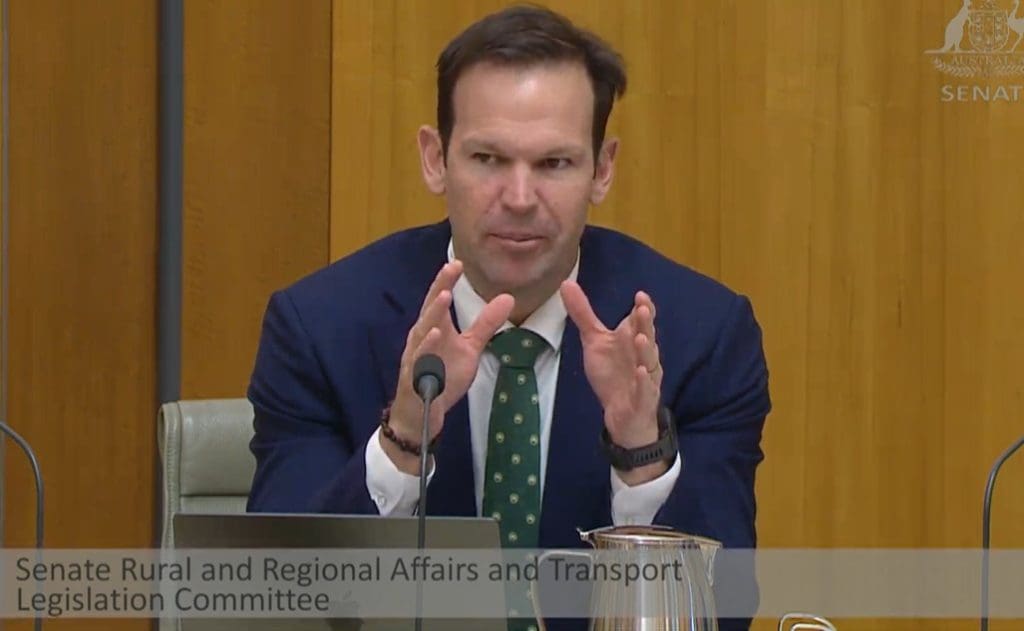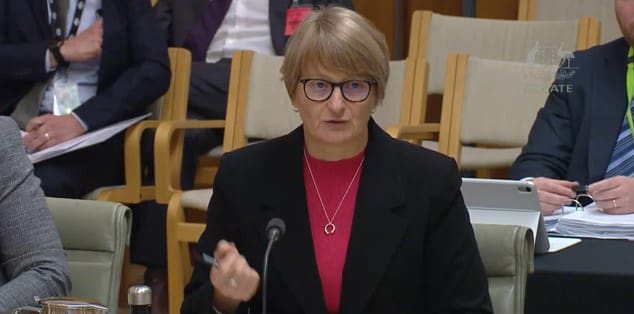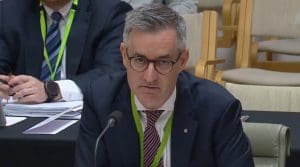
Senator Matt Canavan – take the Trump opportunity on defforestation.
AMERICAN president Donald Trump’s ascendancy was an opportunity for Australia to push back on the European Union’s Defforestation Regulation, Senate Estimates was told yesterday.
Nationals Senator Matt Canavan made the suggestion at a Rural and Regional Affairs and Transport Legislation Committee hearing after it was disclosed that the Australian Government was not yet considering taking trade rules action against the European Commission over the regulation.
The hearing also heard that the Department of Agriculture Fisheries and Forestry had not sought legal advice on whether the regulation was compliant with World Trade Organisation rules.
The EUDR seeks to ensure products are not linked to forest degradation, nor illegal harvesting and trade and there is concern it could impact Australia’s red meat imports into the EU.
Nationals Senator Matt Canavan told the hearing he is concerned that it sounded like Australia is cooperating with the EU on the regulation. He said the EU is part of the international trade system and the committee is often told that certain things can’t be done because of obligations under the World Trade Organisation.
He asked if it was the Australian Government’s position that the defforestation regulation is appropriate and compliant with international trade rules, and whether the Australian Government was taking further action.
Submission for low risk rating, no legal advice sought

DAFF deputy secretary for agricultural trade and regulation Tina Hutchison – no legal advice sought on EUDR’s WTO compliance.
DAFF deputy secretary for agricultural trade and regulation Tina Hutchison told the RRAT Committee that DAFF had made a submission for Australia to receive a low risk rating and continued to advocate for that.
Ms Hutchison said the department has not sought legal advice on whether the regulation was WTO compliant.
“But that maybe is a matter for DFAT, who lead the Australian Government in relation to matters of that kind, but we are working with like-minded nations and in the WTO to continue to raise our concerns and issues….”
She said the previous Minister for Agriculture Fisheries and Forestry (Murray Watt) wrote to the EU seeking a regulation delay or an exemption for Australia.
And Australia’s Minister for Agriculture, Fisheries and Forestry Julie Collins met with the recently appointed EU Agriculture Commissioner Christophe Hansen in January and stressed the importance of avoiding a ‘one size fits all’ approach to regulation, she said.
Ms Hutchison said DAFF continued to engage closely with the European Commission and like-minded countries on the issue, but the Australian Government at this stage is not considering taking further action.
“It is a rule that is now in place in the EU and we’re working very hard to put the Australian position in relation to … the Australian view of that and how we consider that that’s going to be given effect to and helping industries prepare for that.
“But it is a rule that is in the EU legislation.”
Ms Hutchison said she understood the EC was committed to releasing country risk ratings by 30 June “which is something that Australia is particularly interested in, which will determine the number of checks placed on imports at the EU border.”
She said there is a range of work going on with the industry and the European Commission about the European Defforestation Regulations, for which implementation has been delayed 12 months to the 30th of December.
“So we’ve been engaging with industry and NGOs and the states in particular clarifying how agricultural land use exemptions will apply.”
Not putting up a lot of fight – Canavan

DAFF secretary Adam Fennessy at Senate Estimates yesterday.
DAFF secretary Adam Fennessy said Australia was working with like-minded countries on the issue, including the United States.
“We work with like-minded countries to push back on this form of regulation, so we’ve certainly been very active and continue to be very active with other like-minded countries, including Canada, New Zealand etc and also some European countries themselves.
“There is a number of European countries that are not happy with the EU Commission regulation,” he said.
“So at every opportunity we make our views very clear to the EU.”
Senator Canavan said the government’s stance seemed to be one of “just sit back and take it from the Europeans.” And he queried whether the government had indicated it did not support the regulation or whether it just had concerns around implementation.
Mr Fennessy said the Australian Government had been consistent in its position on the regulation, and this was reiterated by the Assistant Minister for Agriculture Anthony Chisholm.
Senator Canavan gave credit for the government’s work to try to delay the EUDR but said it was pretty clear to him that it was “not putting up a lot of fight” over the regulation.
“To my mind and for most Australian primary producers, we don’t see why we should allow the European Union to regulate what goes on on Australian farms, it’s effectively what this does.”
Mr Fennessy said Minister Collins has made contact with the office of the new US secretary of Agriculture and DAFF is in constant contact through its Washington-based staff with US officials.
As to whether the government or DAFF had raised the EUDR with US officials since the inauguration of President Trump, Mr Fennessey said: “We’ve certainly discussed this issue in the past with the United States,, they are one of the like-minded countries that we’ve worked with to make our views very clear to the EY, whether we’ve done that in the last few weeks, I’m not sure.”
“I’m not sure if my colleagues can advise me on that, but this has certainly been on the agenda with the United States in the recent past.”
DAFF acting first assistant secretary, trade and international division Jo Grainger said DAFF’s colleagues in Brussels continue to talk and work with US officials in the Trump administration on the EUDR. She said a DAFF officer will be going to WTO SPS and TBT committee meetings in March and the department will continue to engage with US officials on the regulation.
The Trump opportunity
Senator Canavan said he had seen US media about the necessity to push back on the EU’s broader environmental agenda, including the EUDR.
“It just seems to me we have a real opportunity here to keep pushing.”
But he said the key question is whether the government is open to joining with countries like America, Canada and India in taking WTO action against the EUDR.
“I think deputy chair, we’ve certainly worked with all those countries you’ve mentioned and as to the WTO-specific action, that’s something we continue to work on with those like-minded countries,” Mr Fennessy said.
However, Nationals Senator Susan McDonald wanted to know if Australia is taking a position on the regulation.
“Which is to say that the tree-clearing requirements from the EU are unreasonable and unsustainable in the Australian context.”
Mr Fennessy said Australia had made that position very clear through both recent Ministers for Agriculture.
“And that continues to be our position.
“So we are doing both; the process with like-mindeds as well as putting our views in writing and taking our views through the Minister to Brussels,” he said.
“The other approach that I’ve taken is that we briefed the now Australian ambassador to the EU, Ambassador (General Angus) Campbell.
“That was our top priority when I met with him (late 2024) before he went to Brussels, so of all the agricultural issues that was our number one priority.”
Ms Hutchison said DAFF has been supporting industry-led projects including the AgTrace led by the Food Agility Co-operative Research Centre that undertook a pilot to test EUDR compliance with relevant EU importer and consular authorities.
“The pilot ended in December and the outcomes will be shared with key industry stakeholders during a briefing that is due to be held on the 18th of March.
“The system is a voluntary one; it was designed to test whether credentials and information could be gathered and could be consolidated, and provided in a format that would meet the requirements of the EUDR.
“But it’s not an approved methodology; it was a trial to determine whether it could be done and that would be available should people be interested in investing in that approach.”

HAVE YOUR SAY